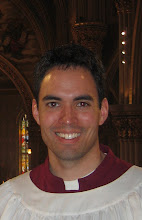Hymnody and Psalmody for the Fourteenth Sunday in Ordinary Time
Praise, My Soul, the King of Heaven - LAUDA ANIMA
Psalm 123 - Our eyes are fixed on the Lord - Suzanne Toolan
Lord, Whose Love In Humble Service - BEACH SPRING
Psalm 34 - Taste and see the goodness of the Lord - Michel Guimont
America the Beautiful - MATERNA
Lectionary Reflection
Today and for the next two Sundays, the Church’s readings present us with an opportunity to understand more deeply the nature of Christ – namely Who He is and what this means for our faith. For example, there are two names which we commonly hear attributed to Jesus Christ that contain in themselves a great depth of meaning. These titles are Son of God and Son of Man, and they are found very often throughout the Old and New Testaments to foreshadow His coming and describe His divinity and humanity.
The term Son of Man – filled as it is with very complex meanings – is used today to address the prophet Ezekiel in the Old Testament. In this instance, it identifies the human nature of Ezekiel immediately before the Lord sent him to be a prophet to the Israelites. While prophets were messengers of God sent to proclaim His word and His will, they were chosen from from among the people, which meant that they were human:
"Son of Man, I am sending you to the Israelites…and whether they heed or resist – for they are a rebellious house – they shall know that a prophet has been among them."
As we will hear in the first reading today, Ezekiel was sent with a message from God in order to correct Israel’s rebellious ways. Even in the midst of this commission Ezekiel was warned that he might not be well-received by everyone. Such was the nature of many of the prophets.
In the Gospel reading, we encounter Jesus exercising His prophetic role: "When the sabbath came he began to teach in the synagogue, and many who heard him were astonished." Immediately, they were surprised at His teaching and seemed to make a "double-take" to verify that Jesus was this boy-from-the-neighborhood, "the carpenter, the Son of Mary." Since this passage from Mark’s Gospel does not include an explicit message from God the Father actually sending Christ, this becomes a moment of dramatic irony when we know something about Christ that those around Jesus had not yet come to understand – namely His divine nature.
The human nature of Christ is empasized today, as He teaches with authority, as one sent by God. This helps us to understand the role of a prophet and to recall our own baptism into Christ’s life, not only as priests (to santify the world with Christ) and kings (to rule with Christ in His heavenly kingdom), but also as prophets to proclaim with integrity the Truth of the Gospel, sent by God into a world that we know might not receive it.
Musical Remarks
On the national observance of July 4th as Independence Day, we celebrate the unique history of this country with a sense of great patriotism. One of the most obvious ways to honor our nation perhaps is by singing the national anthem, The Star-Spangled Banner. Nationalistic music such as this anthem allow us to pay tribute to our country, often beginning most events of our lives – from Major League Baseball games to High School Varsity sports events. In any setting, the music of the anthem is so intimately tied to the text that we would not dare to divorce the two; simply speaking the words "O say, can you see…" would not be able to express the spirit of the poem.
Within the repertoire of American Christian hymnody, there are certain nationalistic hymns that remind us of God’s blessings on this country. One such example today is America the Beautiful sung after Communion. In this text, we ponder the beauty of this land and give thanks to God for His continued guidance and for the gift of liberty. The poem was written by Katherine Lee Bates (1859-1929), an American songwriter. Bates was born in Falmouth, Massachusetts and was the daughter of a Congregationalist pastor. She was an 1880 graduate from Wellesley College in Massachussetts, where she returned as professor of English literature for many years. In 1893, Bates spent the summer teaching English at Colorado College in Colorado Springs, and it was there that she wrote the first draft of the America the Beautiful (the final expanded version written in 1913). She had the following to say:
"One day some of the other teachers and I decided to go on a trip to 14,000-foot Pikes Peak. We hired a prairie wagon. Near the top we had to leave the wagon and go the rest of the way on mules. I was very tired. But when I saw the view, I felt great joy. All the wonder of America seemed displayed there, with the sea-like expanse."
The tune paired with this poem was written by Samuel Augustus Ward (1847-1903) of Newark, New Jersey. Ward studied music in New York and later became an organist at Grace Episcopal Church in Newark in 1880. He wrote the hymn tune Materna, (from the Medieval Latin word mater, meaning "mother") which would later be coupled with Bates' poem, though the two would never meet. Happy 4th of July!




